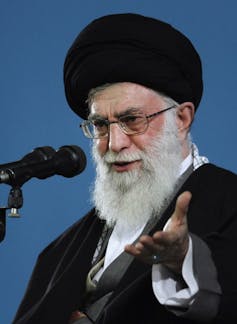In March, UN Secretary-General Ban Ki-moon reported to the General Assembly on the situation of human rights in the Islamic Republic of Iran. Ban expressed concern that women in Iran “are subject to discrimination, entrenched both in law and practice”. The disqualification of all women candidates in the June 2013 presidential elections was one recent example cited.
But late last month, Iran was one of 11 countries elected by acclamation to the UN’s Commission on the Status of Women (CSW). The CSW is:
…the principal global intergovernmental body exclusively dedicated to the promotion of gender equality and the empowerment of women.
Iran was actually re-elected, having been a member of the CSW since 2011. It is putting it mildly to say that the election of Iran to the CSW significantly diminishes the credibility of this body.
A woeful record on gender equality
The states that voted for Iran have re-elected a country that was ranked at 130 out of 136 countries in the 2013 Global Gender Gap Report. In Iran today, among other serious examples of gender inequality and discrimination, a husband can prevent his wife from working outside the home. A married woman cannot obtain a passport without her husband’s written permission.
In an Iranian court, a woman’s evidence is worth half that of a man’s. Women cannot transmit citizenship to their children or a non-citizen spouse. Women are restricted from enrolling in numerous fields of study at public universities. Gender segregation is still imposed in many public spaces.
Given this record, one can be excused for being slightly sceptical of any claim that Iran sought election to the CSW because of a deep-seated commitment to women’s rights. The problem of membership is not limited to Iran. When the CSW also includes members such as Democratic Republic of the Congo, Niger, Pakistan and Sudan, the moral force of this body is undoubtedly diminished. These are not countries renowned for their advancement of women’s rights.
This problem is not limited to the membership of the CSW. On the same day its CSW membership was extended, Iran was also elected to four other UN committees, including the Committee on Non-Governmental Organisations. The United States criticised this election as “particularly troubling” given the record of Iran as a state:
…where authorities regularly detain human rights defenders, subjecting many to torture, abuse and violations of due process.
Such criticisms sound all too familiar when we are looking at the membership of key UN bodies. Who can forget the Libyan ambassador being elected as president of the UN Human Rights Commission at the same time that sanctions for human rights abuses were being applied to her country? Or Sudan being elected unopposed to that commission in 2004 at the same time that ethnic cleansing was occurring in the Darfur region?
UN reform is long overdue
Despite the UN replacing the Human Rights Commission with the Human Rights Council in 2006, partly to avoid these types of problems, little seems to have changed. Pakistan is currently a member of the council, despite being listed as one of the five highest-risk countries in the 2014 Human Rights Risk Atlas.
Saudi Arabia, another member, is similarly listed as a country of “extreme risk” in terms of human rights.

Of course, it may be argued that electing these countries to such bodies may have positive outcomes by shining a light on existing practices and encouraging them to improve their records. In a recent speech Iranian president Hassan Rouhani acknowledged “women must enjoy equal opportunity, equal protection and equal social rights”. This certainly seems to be a step in the right direction.
It is not, however, a sentiment shared by all Iranian leaders. Iran’s Supreme Leader, Ayatollah Ali Khamenei, was recently quoted as criticising gender equality as “one of the biggest mistakes of the Western thought”.
When a key UN human rights body has at its members countries who are themselves the subject of recent UN resolutions condemning their human rights record, the system is in need of serious reform. Last November, the UN General Assembly passed a resolution expressing:
…deep concern at serious ongoing and recurring human rights violations in the Islamic Republic of Iran.
These included:
…pervasive gender inequality and violence against women and increased discrimination against women and girls in law and in practice.
This, in itself, should have disqualified Iran from election to the CSW.
This is just the latest example of the need for reform in the UN. As the High-Level Panel on Threats, Challenges and Change observed in 2004, in relation to the then UN Human Rights Commission:
Standard-setting to reinforce human rights cannot be performed by States that lack a demonstrated commitment to their promotion and protection…The Commission cannot be credible if it is seen to be maintaining double standards in addressing human rights concerns.
Unfortunately, ten years later, this same observation remains just as relevant.

